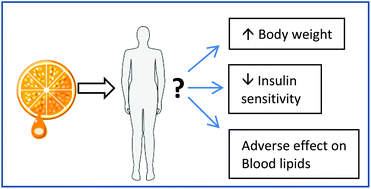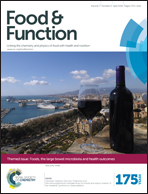Orange juice consumption and its effect on blood lipid profile and indices of the metabolic syndrome; a randomised, controlled trial in an at-risk population
Abstract
Data from epidemiological and in vitro studies suggest that orange juice (OJ) may have a positive impact on lipid metabolism. However, there have been reports in the media claiming detrimental consequences of 100% juice consumption, including weight-gain and adverse effects on insulin sensitivity and blood lipid profile. The effect of daily OJ consumption was assessed using a randomised, placebo-controlled, single-blinded, parallel group design. Thirty-six overweight, but otherwise healthy men (40–60 years; 27–35 kg m−2) with elevated fasting serum cholesterol (5–7 mmol l−1), were recruited from the general UK population. None were using nutritional strategies or medication to lower their cholesterol, nor were regular consumers of citrus products. Assessment of BMI, HOMA-IR, and circulating lipid (total cholesterol, low-density lipoprotein, high-density lipoprotein, non-esterified fatty acids, triacylglycerol, apolipoprotein-A1 and apolipoprotein-B) concentrations, was made when fasted before (V1) and after a 12-week intervention (V2), during which participants consumed 250 ml per d of OJ or an energy and sugars-matched orange-flavoured drink (control). The two groups were matched at V1 with respect to all parameters described above. Although triacylglycerol concentration was similar between the groups at both visits, a trend for the change in this variable to differ between groups was observed (P = 0.060), with those in control exhibiting a significant increase in triacylglycerol at V2, compared with V1. In OJ, those with the highest initial triacylglycerol concentration showed the greatest reduction at V2 (R2 = 0.579; P < 0.001), whereas there was no correlation between these variables in controls (R2 = 0.023; P = 0.548). Twelve weeks consumption of 250 ml per d of OJ did not adversely affect insulin sensitivity, circulating lipids or body weight.


 Please wait while we load your content...
Please wait while we load your content...